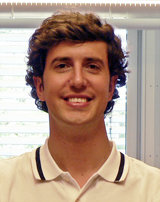ERC Starting Grant 2013 for Dr. Oriol Romero-Isart
He has won the grant for his QSuperMag (Harnessing Quantum Systems with Superconductivity and Magnetism) project.

Dr. Oriol Romero-Isart, a young Catalan research scientist working in the Theory Division of Professor Ignacio Cirac at the Max-Planck-Institute of Quantum Optics (Garching near Munich), has been selected by the European Research Council as one of the recipients of an ERC Starting Grant for the year 2013. The European Research Council, founded in 2007, is the first pan-European funding body. The ERC Starting Grant supports excellent projects of creative young scientists over a period of five years. Dr. Romero-Isart has won the grant for his QSuperMag (Harnessing Quantum Systems with Superconductivity and Magnetism) project. The main goal of this project is to investigate the use of magnetic fields and superconductors instead of laser light to control quantum systems in an unprecedented parameter regime.
Oriol Romero-Isart was born in Terrassa (Barcelona) in 1981. He started his physics education at the Universitat Autònoma de Barcelona where he graduated in 2004. There he continued his research as a PhD student under the supervision of Professor Anna Sanpera. For his thesis (Quantum Information with Strongly-Correlated Systems: from Engineering to Detection) which was completed in September 2008 with “summa cum laude”, he received the PhD extraordinary prize from the Universitat Autònoma de Barcelona. He then joined the Theory group of Professor Ignacio Cirac as an Alexander von Humboldt postdoctoral fellow. Since 2011 he has been Associate researcher at the Theory Division.
During the last years at MPQ Dr. Romero-Isart has worked on proposing experiments and developing the underlying theory to bring macroscopic objects, such as nano- and micro-spheres, into the quantum regime. The main focus was on optical levitation of dielectric nano-spheres in optical cavities. Recently, he has started to work along the lines of the project for which he has received the ERC Starting Grant. The motivation of this project is that laser light, which has been the ubiquitous tool in the last decades to control and manipulate quantum systems, poses fundamental limitations, such as heating and decoherence due to scattering and absorption of photons, and a minimum length-scale to achieve coherent control due to the diffraction limit.
In the course of the QSuperMag project Dr. Romero-Isart wants to overcome these obstacles. He intends to propose experiments and derive the underlying theory in which one uses magnetic fields and superconductors to harness quantum degrees of freedom in order to access an unprecedented parameter regime in the fields of quantum micro- and nanomechanical oscillators, quantum simulation with ultracold atoms, and solid-state quantum information processing. For example, he will explore magnetic levitation of superconducting microspheres to prepare unprecedented-sized quantum superpositions. He will also study superconducting vortex magnetic nanolattices for ultracold atoms to simulate quantum many-body physics with low decoherence and three orders of magnitude larger energy scales than in standard optical lattices. In addition, he will consider superconductors to enhance the coupling of remote magnetic nitrogen-vacancy (NV) defect centres in diamond with the goal of designing an all-magnetic quantum information processor.
Only recently Dr. Romero-Isart has been awarded with the ‘Premio Investigador Novel en Física Teórica’ of the Spanish Royal Society of Physics and the BBVA Foundation (Madrid). He was also elected for an Emmy Noether Grant of the Deutsche Forschungsgemeinschaft (DFG) which would enable him to establish a research group at MPQ. However, having accepted a position as a Full Professor at the University of Innsbruck (Austria) and as Junior Research Director at the IQOQI (Institute for Quantum Optics and Quantum Information) Innsbruck – both positions starting in fall 2013 – he had to decline this grant. "Both the position at Innsbruck and the ERC Starting Grant offer me optimal conditions to face the exciting challenge of starting an independent research group". Olivia Meyer-Streng
